Recent posts
-

-
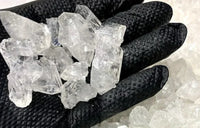 What Are THCa Diamonds?October 14, 2025
What Are THCa Diamonds?October 14, 2025 -
 Delta 9 Gummies GuideOctober 8, 2025
Delta 9 Gummies GuideOctober 8, 2025 -
 Head High vs Body High: A Guide to Cannabis EffectsOctober 1, 2025
Head High vs Body High: A Guide to Cannabis EffectsOctober 1, 2025 -
 What is THCA Crumble?September 22, 2025
What is THCA Crumble?September 22, 2025 -
 10 Ways to Elevate Self-Care Awareness MonthSeptember 14, 2025
10 Ways to Elevate Self-Care Awareness MonthSeptember 14, 2025

What's The Difference Between Functional Mushrooms and Magic Mushrooms?
By Zero Point
Table of Contents
Mushrooms have always held a fascinating spot in human culture, history, and cuisine. From ancient shamans to modern chefs, these fungal forms have been revered, feared, and celebrated for their diverse properties and uses. In recent years, the distinction between functional mushrooms and magic mushrooms has garnered attention from health enthusiasts, researchers, and those interested in the psychological and therapeutic potential of fungi. This blog post delves into the differences between functional and magic mushrooms, exploring their definitions, uses, health benefits, and the science behind their effects.
Functional mushrooms, often called "medicinal" mushrooms, have been used in traditional medicine for thousands of years, particularly in Asian cultures. These mushrooms are not psychoactive and are prized for their health benefits, ranging from immune support to cognitive enhancement. Examples include Reishi, Cordyceps, and Lion's Mane, among others.
On the other hand, magic mushrooms contain psychoactive substances, primarily psilocybin, which can induce profound changes in perception, mood, and thought. They have a controversial status due to their psychedelic effects but are currently the subject of scientific research for their potential therapeutic benefits in treating conditions such as depression and PTSD.
The differences between functional and magic mushrooms are not just limited to their effects on human health and consciousness. They also extend to their legal status, biological and chemical properties, and the ethical debates surrounding their use. This post aims to provide a comprehensive overview of these fascinating organisms, shedding light on their potential benefits and the controversies that surround them.
In the following sections, we will explore the world of functional mushrooms, detailing their health benefits and uses, before diving into the intriguing realm of magic mushrooms, their effects, and their place in culture and therapy. Join us as we unravel the mysteries of these natural wonders and their impact on health, science, and society.
Functional Mushrooms
Functional mushrooms, often heralded for their health-enhancing properties, have been a cornerstone in traditional medicine across various cultures, especially in Asia. Unlike their psychedelic counterparts, these mushrooms do not contain psychoactive substances and are safe for regular consumption. This section explores the nature of functional mushrooms, highlighting their key types, health benefits, and common uses.
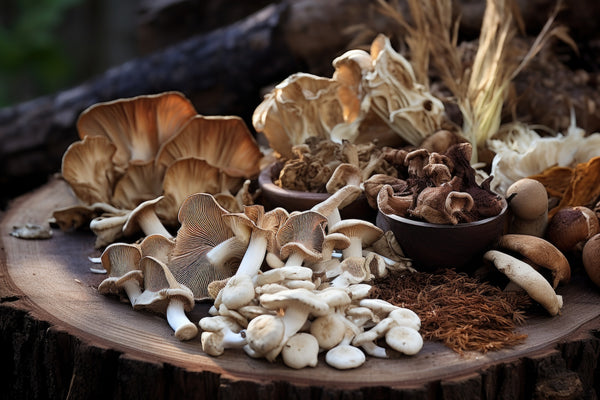
Key Types of Functional Mushrooms
- Reishi (Ganoderma lucidum): Known as the "Mushroom of Immortality," Reishi is celebrated for its ability to support the immune system, reduce stress, and improve sleep.
- Cordyceps (Cordyceps sinensis): This mushroom is famed for its energy-boosting capabilities, enhancing athletic performance and supporting respiratory health.
- Lion's Mane (Hericium erinaceus): Renowned for its brain health benefits, Lion's Mane is believed to support cognitive function, nerve growth, and mental clarity.
- Chaga (Inonotus obliquus): Rich in antioxidants, Chaga supports immune health and reduces inflammation.
- Turkey Tail (Trametes versicolor): Known for its immune-boosting properties, Turkey Tail is also used in cancer treatment to complement chemotherapy.
Health Benefits and Scientific Research
Functional mushrooms are rich in bioactive compounds such as polysaccharides, beta-glucans, and triterpenes, which contribute to their health-promoting properties. Scientific research has begun to back up traditional claims, offering evidence of their benefits:
- Immune System Support: Many functional mushrooms are known for their ability to modulate the immune system, enhancing its ability to fight off infections and diseases.
- Cognitive and Nervous System Support: Lion's Mane, in particular, has shown potential in promoting nerve growth factor (NGF) synthesis, which is crucial for brain and nerve health.
- Antioxidant and Anti-inflammatory Effects: Chaga and other mushrooms possess high levels of antioxidants, helping to reduce oxidative stress and inflammation in the body.
Common Uses in Cuisine and Supplements
The increasing popularity of functional mushrooms in the West can be attributed to their versatile health benefits and the growing body of scientific research supporting their use. As natural and holistic approaches to health continue to gain traction, functional mushrooms stand out for their ability to promote wellness without the side effects associated with many conventional treatments.
Magic Mushrooms
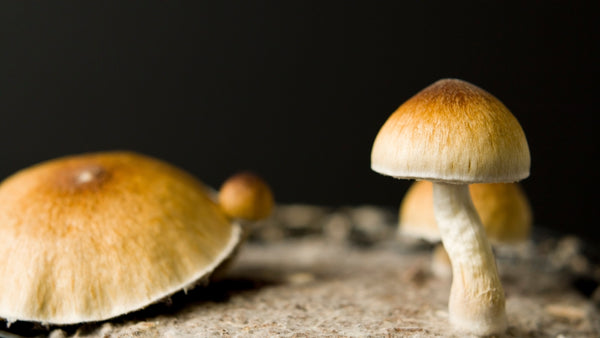
Definition and Key Characteristics
Magic mushrooms primarily belong to the genus Psilocybe, with over 200 species known to contain psilocybin and psilocin, the compounds responsible for their psychedelic effects. When ingested, psilocybin is converted into psilocin in the body, which then interacts with serotonin receptors in the brain, leading to altered perception, mood, and thought.
Historical and Cultural Significance
The use of magic mushrooms dates back to ancient times, with evidence suggesting their use in religious and shamanic rituals in Mesoamerica. Aztec and Maya civilizations referred to psilocybin mushrooms as "teonanácatl," meaning "flesh of the gods," highlighting their sacred status. In modern times, the rediscovery of these mushrooms in the 20th century by Westerners has led to a cultural fascination with their psychedelic effects and potential for spiritual experiences.
Psychological Effects and Therapeutic Potential
The effects of magic mushrooms can vary widely depending on the dose, individual psychology, and environmental context. Common experiences include visual and auditory hallucinations, enhanced emotional states, a sense of interconnectedness, and profound introspective insights. While these experiences can be therapeutic, they can also lead to challenging, sometimes distressing, psychological states.
Recent research has focused on the therapeutic potential of psilocybin for treating a variety of mental health conditions, including depression, anxiety, PTSD, and addiction. Clinical trials have shown promising results, indicating that psilocybin, when administered under controlled conditions, can lead to significant and lasting improvements in mental health.
The Controversy Surrounding Legal Status
Despite their therapeutic potential, magic mushrooms remain illegal in many countries under drug control laws. This legal status is a significant barrier to research and clinical use, although there has been a recent shift towards decriminalization and legal research in some regions. The growing body of evidence supporting the therapeutic benefits of psilocybin is challenging long-standing legal and cultural perceptions of psychedelics.
Magic mushrooms stand at the intersection of ancient tradition and modern science, embodying the potential for profound psychological healing and spiritual growth. As research continues, they may offer new pathways for treating mental health conditions, challenging our understanding of consciousness and the human mind.
Differences between Functional and Magic Mushrooms
While functional and magic mushrooms both belong to the kingdom of fungi, their differences are significant, spanning legal status, biological and chemical properties, and their implications for health and safety. This section outlines the primary distinctions between these two types of mushrooms, shedding light on their unique characteristics and uses.
Legal Status
One of the most apparent differences between functional and magic mushrooms is their legal status. Functional mushrooms are legal in most parts of the world and are widely available in various forms, including dietary supplements, teas, and food products. In contrast, magic mushrooms are classified as controlled substances in many countries due to their psychoactive properties. This legal distinction reflects concerns about the potential for abuse and the psychological risks associated with psychedelic substances. However, the legal landscape for magic mushrooms is evolving, with some jurisdictions beginning to decriminalize their use for therapeutic and research purposes.
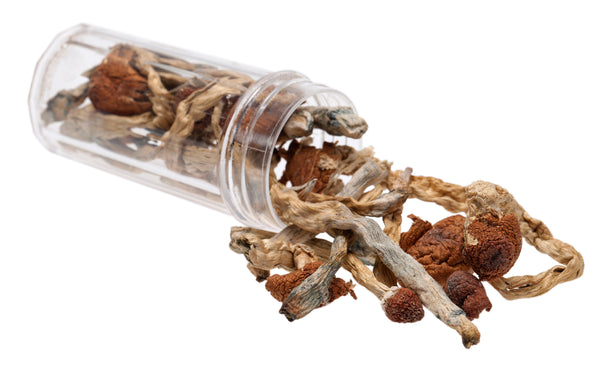
Biological and Chemical Distinctions
Functional and magic mushrooms differ fundamentally in their bioactive compounds. Functional mushrooms contain a variety of substances that contribute to health benefits, such as polysaccharides, beta-glucans, and antioxidants, without inducing psychoactive effects. Magic mushrooms contain psilocybin and psilocin, which interact with the serotonin receptors in the brain, leading to altered states of consciousness.
The biological distinction extends to the species and genera of mushrooms considered functional versus psychedelic. Functional mushrooms include species like Ganoderma lucidum (Reishi) and Hericium erinaceus (Lion's Mane), whereas magic mushrooms are primarily found within the Psilocybe genus.
Health Implications and Safety
Functional mushrooms are generally considered safe for consumption, with a low risk of side effects when used appropriately. They are often incorporated into daily health routines to support overall wellness. In contrast, the safety of magic mushrooms is more complex, given their potent psychoactive effects. While they have a low potential for addiction and minimal physiological toxicity, the psychological risks, such as the potential for experiencing distressing trips or triggering psychiatric conditions, necessitate careful, controlled use, ideally under professional guidance in therapeutic settings.
The therapeutic potential of magic mushrooms, underpinned by growing scientific research, suggests that when used responsibly, they can offer significant mental health benefits. Conversely, functional mushrooms continue to be explored for their broad health-promoting properties, from enhancing immune function to supporting cognitive health.
In understanding the differences between functional and magic mushrooms, it's crucial to appreciate their respective roles in health and culture. While functional mushrooms are widely accepted for their nutritional and health benefits, magic mushrooms, despite their legal and social challenges, are increasingly recognized for their potential to address profound psychological issues, marking a fascinating area of scientific and therapeutic exploration.
The exploration of these differences highlights the diverse potential of mushrooms in health and human consciousness, underscoring the importance of continued research and an open-minded approach to both functional and psychedelic varieties.
The Science Behind the Effects
Understanding the impact of both functional and magic mushrooms requires delving into the science behind their effects on the human body and mind. This section explores the mechanisms through which these fungi exert their distinct influences, offering insights into their therapeutic potentials and psychological effects.
How Functional Mushrooms Support Health
Functional mushrooms contain a variety of bioactive compounds that contribute to their health benefits. Key among these are beta-glucans, polysaccharides known for their immune-modulating effects. Beta-glucans can enhance the immune system by activating white blood cells such as macrophages and natural killer cells, which are crucial for fighting pathogens and cancer cells.
Another important mechanism is the anti-inflammatory and antioxidant properties of functional mushrooms. Compounds like triterpenoids in Reishi mushrooms reduce oxidative stress and combat inflammation, which is linked to many chronic diseases. Additionally, the neurotrophic properties of Lion's Mane, which stimulate the production of nerve growth factors, support brain health by promoting neuron growth and protecting against cognitive decline.
The Mechanism of Psilocybin in the Brain
Magic mushrooms' primary active compound, psilocybin, is converted in the body to psilocin, which then affects the brain by activating serotonin receptors, particularly the 5-HT2A receptor. This activation leads to altered perception, mood, and thought, often described as psychedelic experiences. The profound changes in consciousness experienced under the influence of psilocybin are associated with increased connectivity between different regions of the brain, which normally do not communicate as directly. This can lead to the breakdown of ego boundaries and a sense of oneness with the universe, characteristics of mystical experiences reported by many users.
Recent studies suggest that psilocybin's ability to "reset" brain connectivity patterns may underlie its therapeutic effects. In conditions like depression, the brain's default mode network (DMN) becomes rigidly patterned and overactive, correlating with rumination and a self-focused negative feedback loop. Psilocybin appears to temporarily dissolve this rigid network, allowing for a more flexible state of mind. This could explain the lasting improvements in mental health conditions, as patients gain new perspectives and break out of pathological thought patterns.
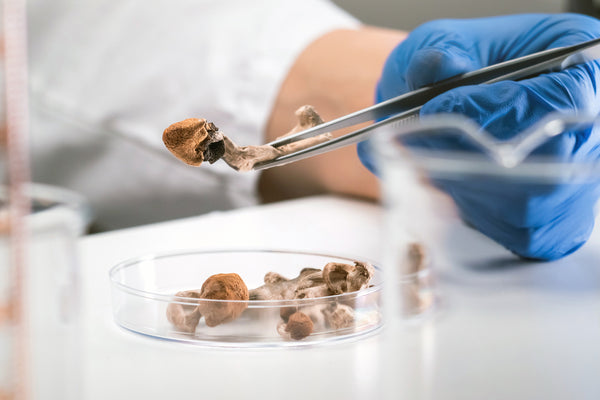
Bridging Functional and Psychedelic Research
The contrast between the direct health-promoting effects of functional mushrooms and the mind-altering impacts of magic mushrooms underscores the diverse potential of fungi. While functional mushrooms strengthen and protect the body through direct biochemical interactions, magic mushrooms offer a radical shift in mental state, with implications for psychological and spiritual well-being. Both, however, share a common ground in their potential to enhance human health and consciousness, albeit through vastly different pathways.
The exploration of these mechanisms not only illuminates the scientific basis for the effects of functional and magic mushrooms but also opens up new avenues for therapeutic interventions. As research continues to uncover the complex interactions between these mushrooms and human biology, the potential for innovative treatments that harness the power of fungi becomes increasingly evident.
Ethical and Legal Considerations
The use of both functional and magic mushrooms raises important ethical and legal considerations, reflecting broader societal debates about natural substances, their benefits, and their risks. This section explores these considerations, focusing on the challenges and opportunities presented by the evolving landscape around mushroom use.
The Legal Landscape
Magic mushrooms face strict legal restrictions in many countries, classified alongside other controlled substances. This classification is primarily due to their psychoactive properties and potential for abuse. However, the legal stance on magic mushrooms is beginning to shift in some regions, driven by scientific research highlighting their therapeutic potential. Decriminalization efforts and legal exemptions for research purposes are emerging trends, reflecting a reassessment of their risks and benefits.
Functional mushrooms, by contrast, do not face the same legal hurdles, given their lack of psychoactive effects. They are widely available and regulated similarly to other dietary supplements and food products. However, the growing popularity of functional mushrooms has led to calls for better regulation and quality control to ensure their safety and efficacy.
Ethical Considerations in Therapeutic Use
The therapeutic use of magic mushrooms, particularly for mental health conditions, introduces complex ethical considerations. Informed consent, the potential for adverse reactions, and the importance of professional oversight are key concerns. The profound psychological effects of psilocybin necessitate a carefully controlled therapeutic environment to minimize risks and support positive outcomes. There is also an ethical imperative to ensure equitable access to these potential treatments, considering the barriers posed by legal restrictions and the cost of therapy.
Balancing Potential Benefits and Risks
The challenge in addressing the ethical and legal considerations surrounding mushrooms lies in balancing their potential health benefits with the risks associated with their use. For functional mushrooms, this involves ensuring that products are safe, accurately labeled, and based on sound scientific evidence. For magic mushrooms, it means navigating the complexities of integrating a traditionally illicit substance into legal medical practice while addressing the societal stigma and regulatory hurdles.
The evolving understanding of both functional and magic mushrooms presents an opportunity to reconsider outdated legal frameworks and ethical standards. By prioritizing research, education, and informed policy-making, it is possible to harness the benefits of these natural substances while mitigating their risks.
Conclusion: The Future of Mushrooms in Health and Society
The exploration of functional and magic mushrooms reveals a rich tapestry of potential benefits, scientific intrigue, and societal challenges. As research into both types of mushrooms continues to unfold, it is clear that they hold significant promise for enhancing human health and understanding the mind.
Functional mushrooms, with their wide array of health benefits, are becoming an integral part of holistic health practices, offering natural alternatives for supporting physical and mental well-being. The challenge lies in ensuring that their use is supported by robust scientific evidence and that products on the market are safe and of high quality.
Magic mushrooms, on the other hand, are at the forefront of a paradigm shift in the treatment of mental health conditions. Their potential to offer profound therapeutic benefits, often where traditional treatments have failed, is a testament to the need for an open-minded approach to natural substances and their place in medicine.
The future of mushrooms in health and society will likely be shaped by ongoing research, legal and ethical debates, and the growing acceptance of their potential. As we continue to explore the depths of their benefits and navigate the complexities of their use, mushrooms stand as a symbol of the untapped possibilities in the natural world and the enduring human quest for healing and understanding.








